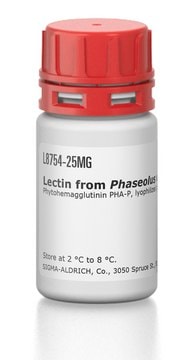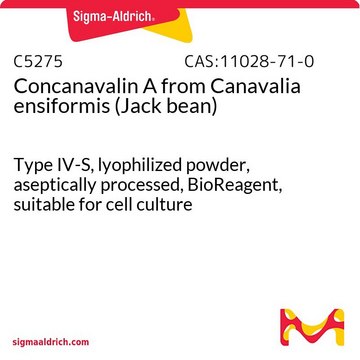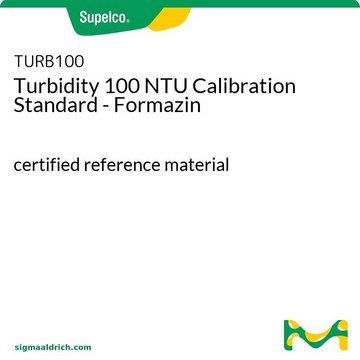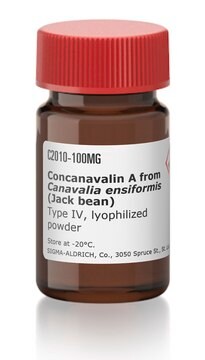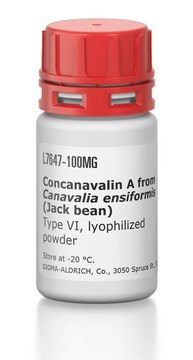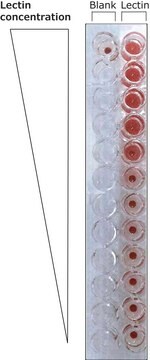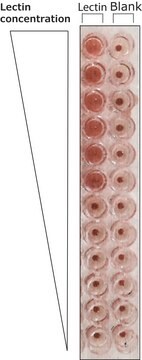L9379
Lectin from Phytolacca americana (pokeweed)
lyophilized powder
Synonym(s):
PWM, Pokeweed mitogen
Sign Into View Organizational & Contract Pricing
All Photos(1)
About This Item
Recommended Products
sterility
aseptically filled
Quality Level
form
lyophilized powder
potency
≤0.3 μg/mL mitogenic activity
storage temp.
2-8°C
Looking for similar products? Visit Product Comparison Guide
General description
Lectins are carbohydrate-binding proteins, omnipresent, found in fungi, plants and animals. The structure of lectin is diversely studied in plants and animals. The secondary structure of this protein is rich in β-strands and possesses a carbohydrate binding sites on the surface.
Application
Lectin from Phytolacca americana (pokeweed) has been used:
- as a medium supplement for mononuclear cell incubation, to induce lymphocyte proliferation
- as a positive control in the study of the role of chemokine (C–C motif) ligand 2 (CCL2) in proliferation and apoptosis of decidual leukocytes
- as a supplement in the RPMI (Roswell park memorial institute) 1640 medium for peripheral blood lymphocyte cultures
Biochem/physiol Actions
Lectin is known to be useful in glycoconjugate characterizing, imaging and targeting. Its use in microarray assay, enable efficient glycome profiling. This is because of its specific interaction with oligosaccharides, glycoproteins and glycolipids. In plants and fungi, lectin defends against pathogens/feeders. Lectin participates in host recognition and tissue adhesion, thereby aids in the pathogenesis of microorganism.
PWM is extracted from pokeweed roots. This protein has hemagglutinating, leukoagglutinating, and mitogenic properties. PWM is not blood group specific, but has affinity for N-acetyl-β-D-glucosamine oligomers.
Physical form
Partially purified TCA precipitate.
Essentially salt-free.
Essentially salt-free.
Analysis Note
Mitogenic activity was determined by BrdU incorporation in HeLa cell cultures.
Signal Word
Danger
Hazard Statements
Precautionary Statements
Hazard Classifications
Resp. Sens. 1 - Skin Sens. 1
Storage Class Code
11 - Combustible Solids
WGK
WGK 3
Flash Point(F)
Not applicable
Flash Point(C)
Not applicable
Personal Protective Equipment
dust mask type N95 (US), Eyeshields, Gloves
Choose from one of the most recent versions:
Already Own This Product?
Find documentation for the products that you have recently purchased in the Document Library.
Customers Also Viewed
Assessment of cellular immune responses of healthy and diseased Tasmanian devils (Sarcophilus harrisii)
Kreiss A, et al.
Developmental and Comparative Immunology, 32(5), 544-553 (2008)
B Hejdeman et al.
HIV medicine, 4(2), 101-110 (2003-04-19)
To study the impact of effective highly active antiretroviral therapy (HAART) on the preservation of long-term CD4 memory cells induced by vaccines in HIV-1-infected patients. Thirty HIV-1-positive patients on HAART with undetectable viral load were randomized into three groups: 10
Brianna R Beechler et al.
PLoS neglected tropical diseases, 11(12), e0006122-e0006122 (2017-12-19)
Schistosomes are trematode parasites of global importance, causing infections in millions of people, livestock, and wildlife. Most studies on schistosomiasis, involve human subjects; as such, there is a paucity of longitudinal studies investigating parasite dynamics in the absence of intervention.
W E Müller et al.
European journal of biochemistry, 183(2), 391-396 (1989-08-01)
Previously it was established [Pahwa, S., Pahwa, R., Saxinger, C., Gallo, R. C. & Good, R. A. (1985) Proc. Natl. Acad. Sci. USA 82, 8198] that nonviable preparations of human immunodeficiency virus 1 (HIV-1) abolish the proliferative response of human
The immune response of the Tasmanian devil (Sarcophilus harrisii) and devil facial tumour disease
Woods GM, et al.
EcoHealth, 4(3), 338-345 (2007)
Our team of scientists has experience in all areas of research including Life Science, Material Science, Chemical Synthesis, Chromatography, Analytical and many others.
Contact Technical Service
